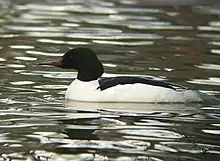비오리
Korean

비오리
Etymology
First attested in the Bullyu dugongbu si eonhae (分類杜工部詩諺解 / 분류두공부시언해), 1481, as Middle Korean 빗올히 (Yale: pis.wolhi).
Probably from 빗 (Yale: pis, “comb”) + 올히 (Yale: wolhi, “duck”) (Modern Korean 오리 (ori)). These fish-eaters have sharply serrated bills, hence also known as English sawbill, Dutch zaagbek, Spanish serreta, and Korean "comb duck."
Pronunciation
- (SK Standard/Seoul) IPA(key): [pio̞ɾi]
- Phonetic hangul: [비오리]
| Romanizations | |
|---|---|
| Revised Romanization? | biori |
| Revised Romanization (translit.)? | bioli |
| McCune–Reischauer? | piori |
| Yale Romanization? | pioli |
Synonyms
- 바다비오리 (badabiori) (Note: Although they are seaducks, most of the mergansers prefer riverine habitats, only red-breasted mergansers being common on the sea.)
References
This article is issued from Wiktionary. The text is licensed under Creative Commons - Attribution - Sharealike. Additional terms may apply for the media files.